Love Japan and Sing of its People's "Heart": Chris Hart (Artist)
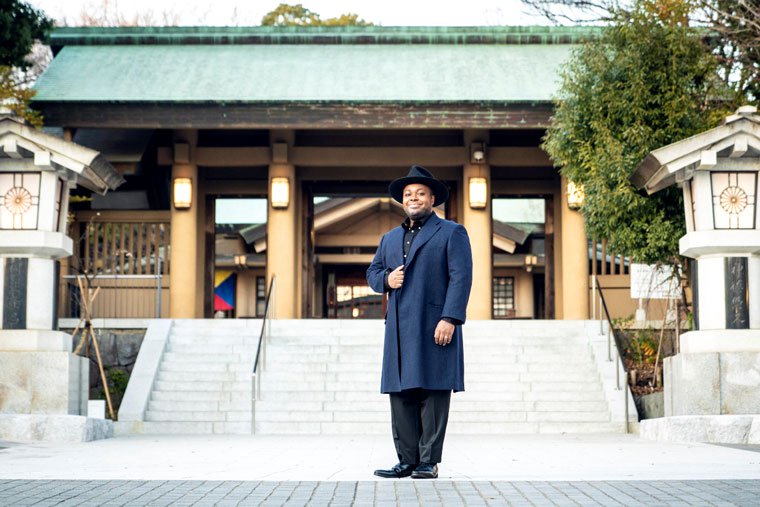
Chris Hart began learning Japanese at the age of 12 and fell in love with Japan after his homestay in the country when he was 13 years old. Currently, he is active in Japan as a J-pop artist. We asked Chris how he improved his Japanese language skills from first getting in touch with the language in the U.S.A. to the present, and about his passion for music as an artist working in Japan.
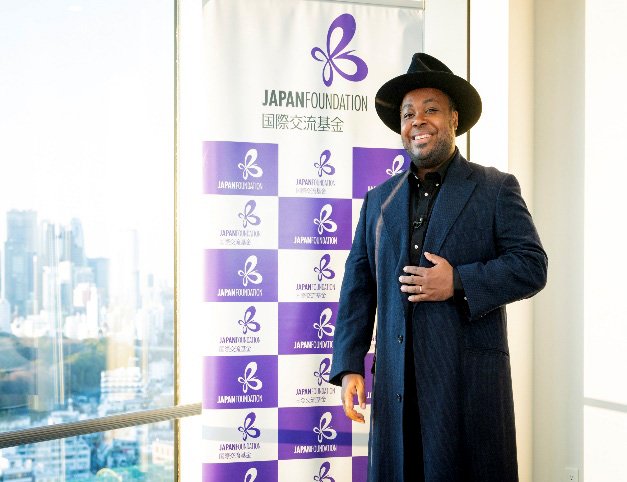
- Chris Hart
- J-pop artist born on August 25, 1984, in San Francisco, California, the U.S.A. In 2012, he made his professional debut after becoming a winner on the TV program Nodojiman the World, and participated in the NHK Kouhaku Utagassen for two consecutive years, in 2013 and 2014. He became a Japanese citizen in 2017
*You can see Chris singing on his Official YouTube Channel
Click the links below to jump to each topic.
About Learning Japanese
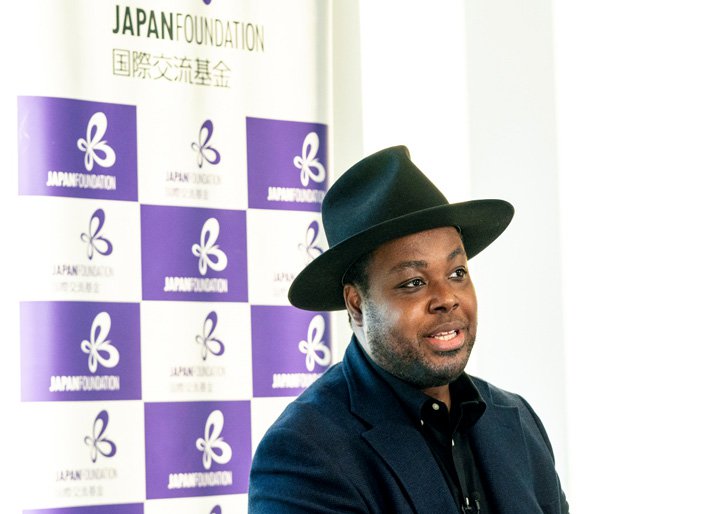
Getting in Touch with the Japanese Language in Junior High School
- ―When did you first get in touch with the Japanese language?
- Chris: It was my first or second year of junior high school. I think they are increasing recently, but I had Japanese classes in my junior high school, which was unusual at that time. My mother and sister had learned Spanish, but I wanted to study a different language, so I started to study Japanese lightheartedly. I quickly fell in love with the Japanese language, and came to like Japanese media such as anime and music. I started to think only about Japan.
- ―Why did you choose to learn Japanese?
- Chris: At that time, I didn't have a particularly strong impression about Japan. I only thought that it was unusual. I chose Japanese because I wanted to try something different. I still think I made a good decision at that time.
- ―Did you start to learn Japanese without any advance image of Japan?
- Chris: Yes, I first got in touch with the Japanese language in my classes. At that time, I only had the image of sushi, and I hoped that I would be able to learn more about Japan in the future.
- ―Please tell us more about your learning environment at that time. Were there Japanese people around you?
- Chris: There were Japanese people in my school, but I didn't have many (Japanese) friends, so I started to learn Japanese with no knowledge.
- ―Were the people around you learning Japanese also Americans?
- Chris: That's right. There were various people such as Asian Americans, but they were all people who didn't know much about Japan, and we wanted to try taking Japanese language classes.
- ―How many times a week did you study Japanese?
- Chris: I studied almost every day, five times a week.
- ―How did you learn Japanese in school?
- Chris: We learned greetings, and there was a brief introduction of Japanese culture, the atmosphere of Japanese schools, and about jobs in Japan. All of this was done with simple words. We were also shown Japanese media, including anime and movies.
- ―Did you become interested in Japan and want to go there someday through studying Japanese?
- Chris: I became interested in Japan when I started learning Japanese, but there were still many things I did not know at the time, and I naturally felt that I wanted to go there. My Japanese teacher realized how I felt and introduced a homestay program to my mother. The teacher said, "I think Chris is interested, so he should go to Japan." That's why I decided to do the homestay for two weeks.
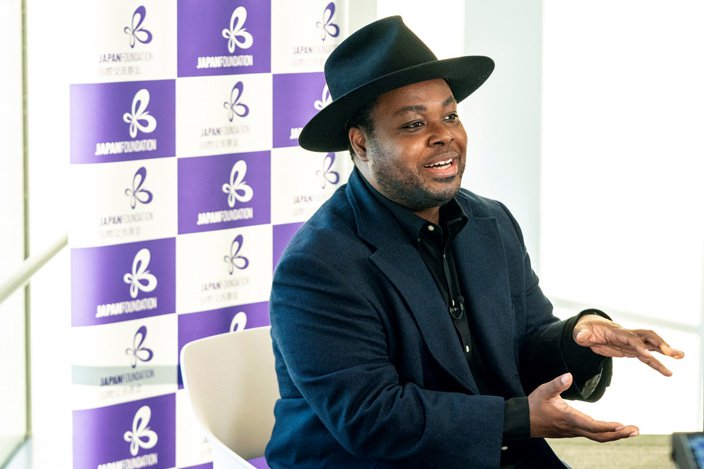
'Life for Japan...': Homestay in Japan that Changed Chris' Life
- ―You decided to do the homestay after being introduced to the program. Where did you stay in Japan?
- Chris: I stayed in Niihari Village, in what is now Tsuchiura City, Ibaraki Prefecture.
- ―Why did you choose there (to do the homestay)?
- Chris: The program had chosen Niihari Village in advance as the homestay location. People around me said that it was better to go somewhere with an atmosphere similar to my hometown, so I decided to participate.
- ―Were you nervous about coming to Japan?
- Chris: It was only for two weeks, so I was not nervous. I just looked forward to going there and I didn't think deeply about cultural differences and fears.
- ―What was your impression of Japan when you came to the country for the homestay?
- Chris: Everything was different from the U.S.A., including the scenery, and I felt like I had entered a different world. During my two-week homestay, the people around me were very nice, and they let me experience a lot of things to have an absolutely fun time. I liked the scenery of Japan, and I naturally felt that I wanted to live forever in Japan. I really did not want to go back to the U.S.A.
- ―What is your greatest memory from your homestay?
- Chris: It was just before summer vacation when I did the homestay. I didn't really like studying at school, but somehow it was really fun to go to school with everyone in Japan and study math and other subjects in Japanese. It was very strange that I even enjoyed studying in Japan, and I really wanted to continue attending a Japanese school. I really liked the rhythm of life in Japan, including the club activities after school.
- ―What club activities did you participate in?
- Chris: I was able to join various clubs such as music and basketball, and had a great time participating in them.
- ―I understand that you attended a Japanese school during your homestay. What did you find difficult about studying at school in Japan?
- Chris: There was nothing in particular, but since it had been only two years since I began to study Japanese, I still could not speak Japanese fluently, and even if I tried my best to use Japanese, I could not be understood. Words were a big problem. However, the people around me tried to understand, and I was able to communicate with them somehow, which was fun.
- ―What did you enjoy or like to do in Japan?
- Chris: Everything was fun. I enjoyed everything from watching TV and playing games to going to school, camping, and shopping.
- ―Besides memories of school, do you have many memories of your host family during your homestay?
- Chris: Yes, I do. I was able to get along easily with my host family, and it was comfortable spending time with them, as if they were my own family. The most memorable moment was when my host family was grilling eggplants and other ingredients that are rarely used for barbecues in the U.S.A. My host grandfather, who had had a few drinks of alcohol, introduced me to natto, or fermented soybeans. Although I first thought, "This is not food," it was very delicious when I tried it. I liked the atmosphere of a lively summer in Japan.
- ―Is there any new food that you enjoyed during your homestay?
- Chris: Yes, curry and rice. It's hard to find in the U.S.A. I thought curry and rice was very delicious. Even after returning to the U.S.A., I wanted to make curry and rice as soon as possible, so I often went to a supermarket for Japanese people and made it myself.
- ―You had a very pleasant experience during your homestay. Did the homestay change you?
- Chris: It was only for two weeks, but my life changed because of that homestay. Just before I returned to the U.S.A., I felt that I had to live in Japan no matter what, and everything I did from that point on was to live in Japan. I felt that my life was for Japan.
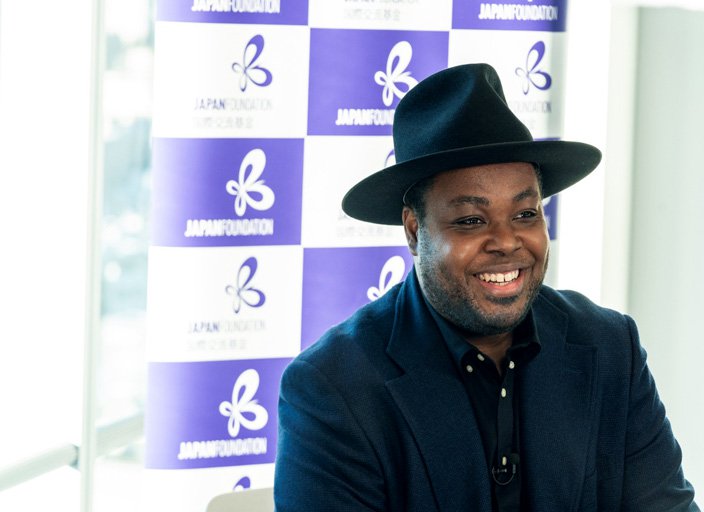
Continuation of Connection with Japan and the Japanese Language After Returning to the U.S.A.
- ―You said that the homestay changed your life a lot, but did you continue to study Japanese when you returned to the U.S.A?
- Chris: I studied Japanese at school even after I returned to the U.S.A. After graduating, I heard that I could get a visa if I had 10 years of experience in a job where I could use Japanese, so I tried to find various jobs where I could use Japanese, such as an English teacher, to return to Japan. After 10 years, my dream of returning to Japan came true.
- ―Do you have any memories from when you were studying Japanese in the U.S.A?
- Chris: When I was in college, studying Japanese was the biggest part of my life. I became friends with a Japanese teaching assistant, and I practiced speaking Japanese with him. We had a lot of fun talking about Japanese culture and music.
I enjoyed not only studying Japanese, but also just talking with my Japanese friends and studying together.
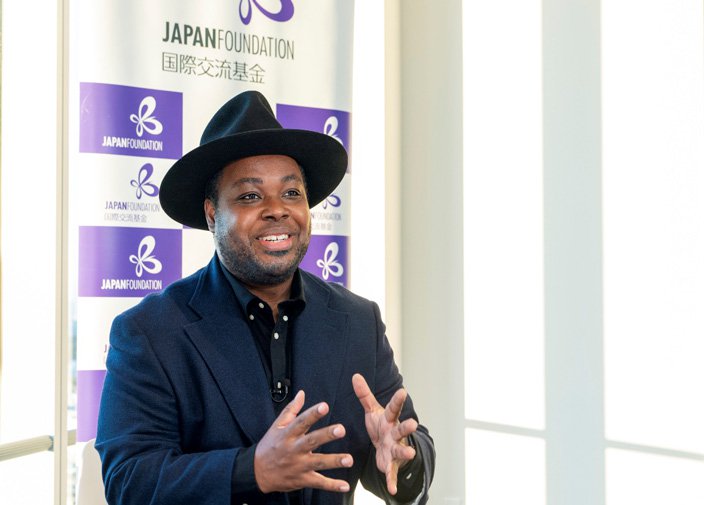
'Everything was Toward Going to Japan...': Choosing a Job in the U.S.A.
- ―After graduating from college, you said that you had jobs where you used Japanese. What types of jobs did you do in the U.S.A. to return to Japan?
- Chris: I used Japanese at the call center for a Japanese cosmetics manufacturer, and even in police work. I also worked where services were provided for Japanese people. I worked at an international airport, too. I looked for jobs that would allow me to interact with Japanese customers as much as possible and use the Japanese language in different situations.
- ―Were you working with a desire to study Japanese?
- Chris: Yes, I used Japanese as much as I could, and I studied a lot through the work. It was very difficult to use the kind of Japanese used at work, such as formal and polite language, but it was also a good learning experience and practice. However, I still felt that my Japanese was not perfect, that I should live in Japan, and that I really needed to study more, so I kept moving forward even though I made mistakes.
- ―You really wanted to go to Japan.
- Chris: Yes, that's right. Believing that one day it would lead to Japan, I worked on everything with the feeling of thinking about Japan and moving forward while doing music activities.
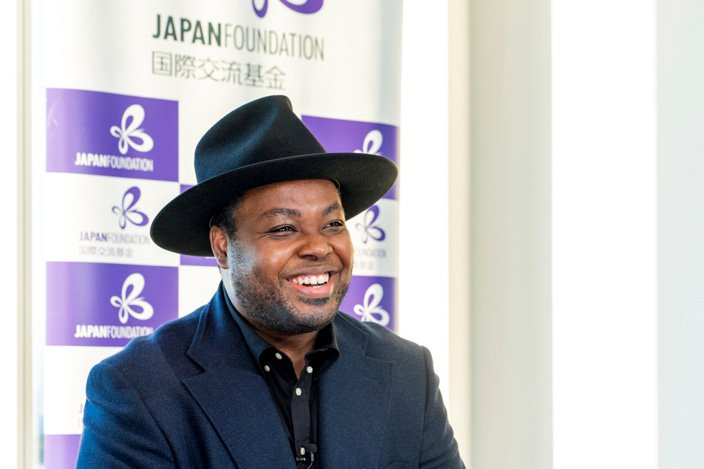
Wish to Return to Japan and Improve Japanese Further
- ―You always wanted to go to Japan while you were working in the U.S.A., so what did you do to be able to come to Japan again?
- Chris: I tried various jobs while doing music activities, but at first, I didn't get the chance to live in Japan. However, my mother was working for a vending machine company, and the company was planning to create a new business in Japan. She introduced me to the company, and I joined and moved to Japan as an engineer and salesman. I was able to live in Japan again, but it was as a salesman.
- ―How did you feel when you got the chance to live in Japan again?
- Chris: I just thought, "finally." However, I was worried, since I still couldn't speak Japanese that well. I didn't have the confidence to use only Japanese in my daily life, and I wondered if I could work properly with courage, knowing that I would definitely make mistakes and feel embarrassed. Even though I was worried and nervous, I moved to Japan with a strong feeling to work hard, as it was my dream to go there.
- ―What was the first difficulty that you experienced while working in Japan?
- Chris: It was keigo, or polite language. It was very challenging and difficult when I needed to speak on the telephone, or talk about machines in my workplace. I could not communicate even though I knew what I wanted to say in English. It was also hard to talk about things related to contracts with other staff members. However, everyone was very kind and spoke slowly, and I managed to get my work done.
- ―How much Japanese could you speak when you came to Japan?
- Chris: I had good listening skills and could speak it in daily conversation, but I didn't know the technical terms used by vending machine attendants. The Japanese I had studied in junior high school and high school was simple, and only at a normal conversation level, so it was very difficult for me to deal with unfamiliar words when I went to Japan alone as an adult and came across medical-related or work-related words.
- ―How did you improve your Japanese from that level?
- Chris: Just like now, I improved my Japanese by putting myself in environments where I had no choice but to speak, even if I made lots of mistakes. Many people in the past and now say, "I don't use Japanese because I am afraid to fail," but in my case, I came to Japan and I could not work without using Japanese from my time working as a salesman. That's why I thought that it didn't matter even if I failed, and I wanted to grow by looking up and studying words that I didn't know as soon as I saw them. My Japanese would not have improved if I didn't have such a strong feeling through the many experiences I had at various jobs. I quickly realized that no matter how much I studied, I wouldn't get better if I didn't use Japanese. Whether or not I could improve my Japanese depended on my reaction and the steps I took after making mistakes. So, I grew with the feeling of always being in survival mode and using Japanese while making mistakes.
- ―You used Japanese and improved your speaking skills.
- Chris: Yes. I talked to many different people, and I felt that I was living my life only in Japanese, since I did not have the chance to use English. If I had studied harder in the U.S.A., I would have been able to learn Japanese well, but I think it is possible to improve [in any environment] if you are willing to use Japanese without running away, no matter how much you fail.
- ―Tell me the best way to study Japanese.
- Chris: There may be better ways, but I studied kanji mostly with lyric cards, and I also practiced reading and pronunciation through music. A lot of people are studying by watching anime. I think that is fine, but studying kanji with lyric cards and watching news programs and variety shows on TV were the two best methods that had the biggest impact for me. I think it is best to listen to the natural rhythm of speech, such as natural conversations and the Kansai dialect, and I think that no matter how hard you study, if you don't listen to natural Japanese and only listen to the example conversations on CD, you will not get better. Dialects were particularly difficult, and I studied everything by watching news and variety shows.
- ―Please talk about the variety and news programs that you often watched.
- Chris: There was the Japanese music program called "HEY!HEY!HEY!" that was broadcast when I was in high school. I learned a lot from the way they spoke during interviews and the Kansai dialect. Also, the comedy show "Warau Inu" was very funny, and it taught me about the Japanese sense of comedy. Their Japanese was faster than usual, so it was very useful. I was able to hear many different kinds of spoken Japanese through variety and news programs.
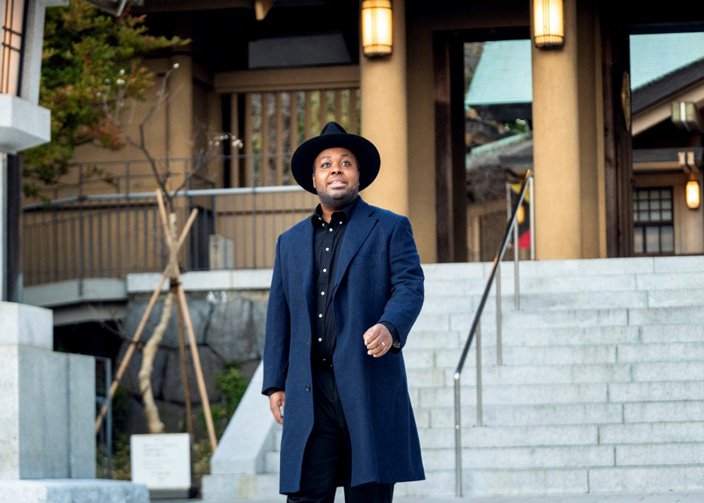
Advice to Japanese Language Learners
Please study hard. Please study not only the Japanese language, but everything about Japan, including its culture. I think that you will definitely meet interesting people through studying Japanese, and it may also change your life. You will have a very good time if you enjoy studying.
About Music Activities
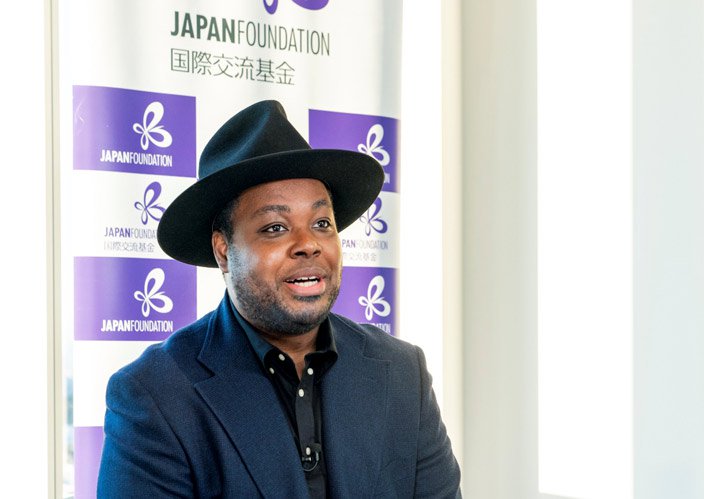
Japanese × Music Activities Natural Things for Chris
- ―Did you do any activities in high school or college using Japanese?
- Chris: When I was in high school, my Japanese friends and I liked to talk about music and we decided to make a band. I couldn't play any instrument at that time, so I started singing songs in Japanese as a vocalist.
- ―Have you been singing in Japanese since then?
- Chris: Yes, I have. I have always sung in Japanese, and rarely sang in English.
- ―Was it strange when you first started singing in Japanese?
- Chris: I personally liked Japanese music, and my mom sang songs in Spanish instead of English, so it was not strange to sing songs that were not in English. I just enjoyed singing in Japanese and didn't think deeply about it.
- ―At that time, did you understand the meaning of the Japanese lyrics you were singing?
- Chris: I would first study the meaning of the Japanese lyrics before singing them. This was also a very good way to practice Japanese. I read lyric cards to study kanji, read aloud to practice my pronunciation, and studied the content of lyrics to understand their meaning. This was a good way to study Japanese.
- ―You've been understanding and singing lyrics in Japanese since high school. What does it mean for you to sing in Japanese?
- Chris: It's just natural for me to sing in Japanese. Many people seem to think that I performed in English in the U.S.A., but I have been singing in Japanese since the beginning. Since I have been routinely singing in Japanese, it feels strange when I am asked to sing in English. For me, singing in Japanese is about deepening my ties with Japan. When I am singing in Japanese, I am singing with gratitude for all of the people I have met so far. It is unnatural for me if I don't sing in Japanese.
- ―What is the difference between singing in Japanese and English?
- Chris: For Japanese songs, the lyrics are important and you can't sing without understanding them. You can sing American songs just from the flow, even if there isn't meaning in every word of the lyrics. Lyrics are more important than anything else in Japanese songs. Japanese people are moved and touched by the lyrics, and you have to think about Japan seriously in order to understand those lyrics. When I was studying to understand Japanese lyrics while in junior high school, I had a general impression of the lyrics, but actually living in Japan helped me understand them better. For example, I realized that when talking about cherry blossoms, it's not just about the flowers, but also the season. Japanese culture and lyrics are connected, and unless you have traveled to Japan or had some other experience in Japan, I don't think you can fully understand the lyrics. And if you don't understand the lyrics, then you won't be able to sing the songs.
- ―Do you want to continue singing in Japanese?
- Chris: Yes, I do. I have been receiving more requests from fans to sing in English, and I sing in English for them to enjoy, but in my mind, singing in Japanese is the most natural for me.
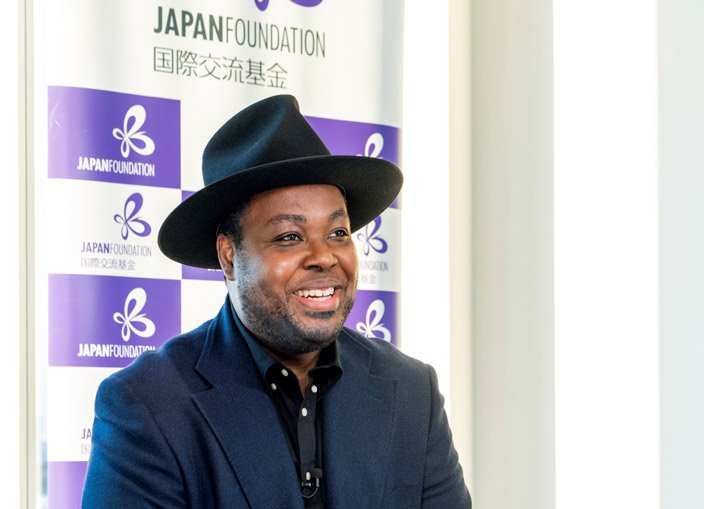
Work × Music Activities Determined to Live in Japan as a J-pop Artist
- ―Please talk about the relationship between your work and music activities. Were you doing music activities after coming to Japan again?
- Chris: After coming to Japan, I took a year off and worked hard to get used to Japanese life by thinking only about my work. I restarted my music activities from the second year. I worked from morning to night, and practiced singing and performed live concerts after work. It was harder than I expected.
- ―You worked and did music activities at the same time. How did you manage?
- Chris: I've wanted to live in Japan since I was 12 or 13 years old, and after 10 years, my dream of living in Japan came true. Initially, rather than wanting to be a singer, I thought of music as a way to live in Japan, and that it would be great if I could live there through performing. After coming to Japan, I met various people through music and had many pleasant experiences. I continued my activities thinking that I could study Japanese culture, and while hoping that I could get the chance to make a debut. At that time, various live performance offers came through the music companions I met, and I felt that my music career had progressed thanks to the influence and support of the people around me. I was able to succeed because of the great experiences of studying Japanese, working in Japan, and meeting people through my music.
- ―You had to balance your work and music activities. How were you able to make your debut as a professional singer in Japan?
- Chris: One day, while I was still only half-serious about pursuing my music career, I was invited to sing and appeared on a TV show where I had to sing a famous Japanese song. I got contacted later by the producer of the show and was introduced to the label. It really is thanks to everyone.
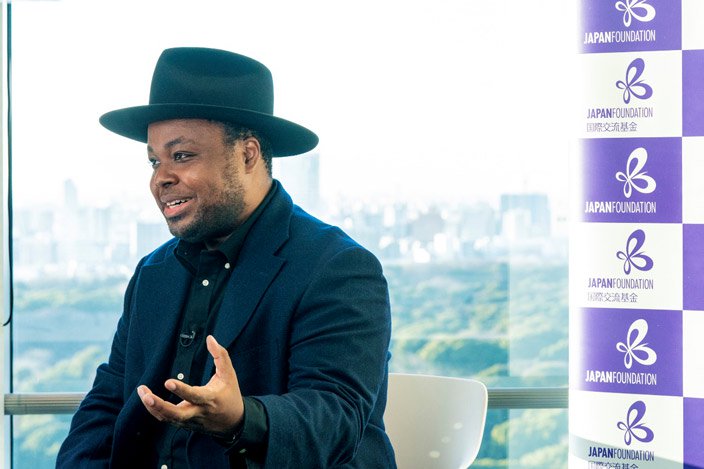
Writing Lyrics and Music, and a Strong Desire to Make Remakes
- ―After the debut in Japan, you are known for remaking the songs of other artists, but do you also write your own music?
- Chris: Yes, I do. Since my debut, I have tried to compose the lyrics to two or three songs, but most of all I wanted to learn Japanese songs. When I made my debut, I thought that remakes would allow me to learn more about Japan, and would be a chance to understand Japanese culture. Even when I make original songs, I create them with other writers, which greatly helps me learn Japanese. I studied production and composition while not performing, and I have recently been composing music and lyrics with the feeling that they are new stories by me.
- ―What do you think about when singing remakes?
- Chris: I think I am responsible for preserving the quality of the original song. It is important not only to sing the songs well, but also to try to tell the story and to cherish the feelings of various people for the song. You can't just sing them lightly.
- ―Do you understand the meaning of the lyrics when you sing a remake?
- Chris: I understand the meaning of the lyrics, study all the feelings of the original artists and the thoughts of fans, and sing while thinking about that.
Japanese Fans and Musical Artists Chris Admires
- ―You have been active as a J-pop artist in Japan for a long time. Please tell me your impression of your Japanese fans.
- Chris: They are kind. Everyone is very kind, just like at my homestay, and they do their best to teach me about Japanese culture and many other things about Japan so that I can enjoy my time in Japan. They have also taught me about music, as well as the stories and feelings of each song, and are very warm and kind to me.
- ―Which musical artists do you admire?
- Chris: There are so many. One is Tamaki Koji. His lyrics are good, and he is able to create a variety of songs, including soulful songs, funky songs, ballads, and up-tempo songs. He can do anything as an artist. You can feel his passion through his lyrics and voice. I met him once, and he was really an amazing man. I have always wanted to be that kind of musician.
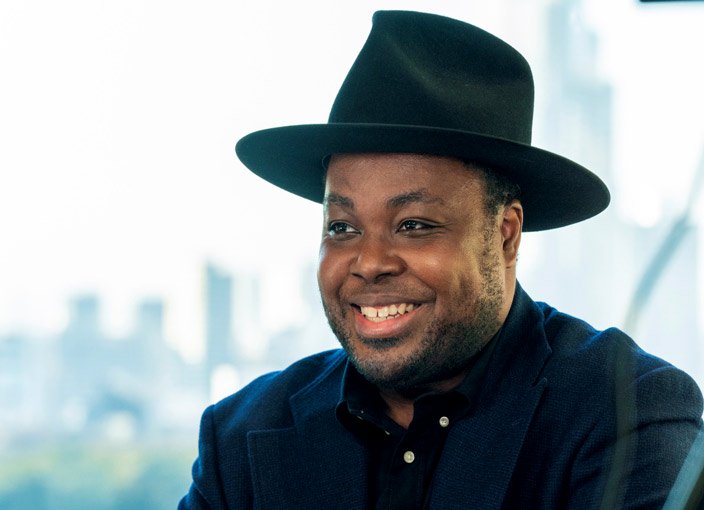
Future Goals/Advice for Aspiring Professional Singers
- ―What are your future goals as a singer?
- Chris: I hope to be able to be a producer for various artists in addition to my own career. I have been able to come this far thanks to the support of various people, so I want to help and support others in the same way.
- ―At last, please give the advice for aspiring professional singers.
- Chris: If you have a dream, you should cherish it and work hard to make it a reality. You don't know what will happen, and you don't know how you can fulfill that dream, so I think you will have the chance to grow while working hard and meet many different people. My first expectations and current career are completely different, and my dreams naturally changed. Thanks to meeting of various people, I've had opportunities that I couldn't have imagined. I think it is best to cherish your dreams, and to move forward while changing with them.
Chris has many fans because of his outstanding singing abilities. We look forward to his future success in Japan!
- What We Do Top
- Arts and Cultural Exchange [Culture]
- Japanese-Language Education Overseas [Language]
- Japanese-Language Education Overseas [Language] Top
- Learn Japanese-language
- Teach Japanese-language
- Take Japanese-Language Test
- Know about Japanese-language education abroad
- The Japanese-Language Institute, Urawa
- The Japanese-Language Institute, Kansai
- Japanese-Language Programs for Foreign Specified Skilled Worker Candidates
- Japanese Language Education for Japanese Children Resident Overseas and for the Descendants of Migrants
- Archives
- Japanese Studies and Global Partnerships [Dialogue]
- JF digital collection
- Other Programs / Programs to Commemorate Exchange Year
- Awards and Prizes
- Publications
